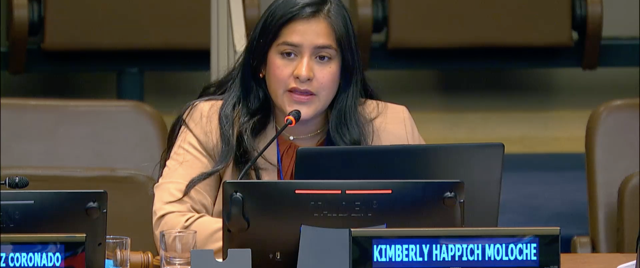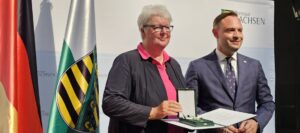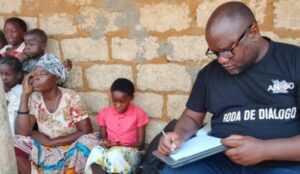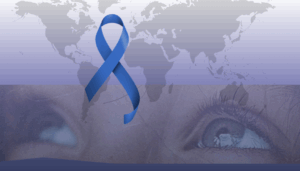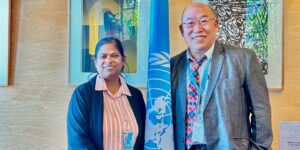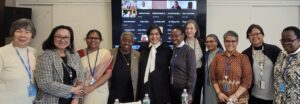By Kimberly Happich Moloche, Congregational NGO Representative to the United Nations and Director of Advocacy, New York
On February 14, 2025, as the Civil Society Forum came to a close at the United Nations Headquarters in New York, I stood before a room filled with dedicated advocates, grassroots leaders, UN representatives, and civil society members. It was a moment of reflection, a culmination of powerful discussions and shared commitments—but more than that, it was a call to action.
This year’s Civil Society Forum was held on the final day of the 63rd Session of the Commission for Social Development (CSocD63), centered around the theme of strengthening solidarity, social inclusion, and social cohesion. As co-chair, I had the privilege of guiding conversations that not only uplifted the voices of those often unheard but also sought concrete pathways to policy change and systemic transformation.
The energy in the room was undeniable. We heard from grassroots activists who are reshaping their communities, youth leaders who are redefining advocacy, and policymakers who recognize the urgent need for inclusive action. From the Opening Panel—which highlighted the commitments made since the Copenhagen Declaration nearly 30 years ago—to the thematic sessions focusing on grassroots leadership and intergenerational collaboration, the Forum was a testament to the power of collective action.
CSocD63 underscored the ongoing commitment to the 2030 Agenda for Sustainable Development, with the Commission reaffirming its dedication to global social progress. The session highlighted the upcoming Second World Summit for Social Development, to be held in Doha, Qatar, later in 2025. This summit is a critical opportunity to reset global priorities, ensuring that the commitments from the Copenhagen Declaration continue to inform global policy on social inclusion, equity, and sustainability. As the Chair of CSocD63, H.E. Krzysztof Maria Szczerski of Poland, and other key stakeholders noted, the Summit will provide momentum toward achieving the Sustainable Development Goals (SDGs).
At the heart of CSocD63 was the theme of strengthening social solidarity, a crucial factor in accelerating the implementation of the Copenhagen Commitments. The Commission adopted five resolutions that emphasized social inclusion and called for renewed attention to social resilience—especially in light of growing global crises. The discussions were not limited to theory; they directly addressed emerging issues like universal rights-based social protection systems, which are vital to ensure that the most vulnerable populations are supported during times of uncertainty.
The high-level panels during the session added depth to these conversations. A particularly impactful moment was the panel on social resilience in the face of frequent, complex crises, where experts shared insights into policies that adapt to evolving risks. The session on youth highlighted the vital role of young people in shaping inclusive societies and securing intergenerational collaboration. Youth engagement is not a side issue; it is central to the transformation we seek, as seen in the remarkable contributions from young leaders throughout the event.
The role of grassroots leadership continued to be a focal point at CSocD63. We heard inspiring stories from activists leading community-driven initiatives that are making tangible changes. These efforts, despite challenges, emphasize the power of local action in promoting social inclusion and advancing the 2030 Agenda.
Throughout the Forum, we reaffirmed that our work does not end with conversation. The lived realities of people facing poverty, discrimination, and exclusion must drive our policies and advocacy. As I stated in my closing remarks:
“This Forum is not just a moment—it’s a movement. A movement for justice that knows no borders, no barriers, and no exclusions. The voices we’ve lifted must spark action. The connections we’ve built must fuel advocacy. And the commitments we’ve made must become lasting change.”
This call to action is more than rhetoric – it is a commitment. The discussions held during this Forum will serve as a foundation for the Second World Summit for Social Development in Qatar, later this year, ensuring that civil society remains at the heart of global decision-making. The World Social Summit aims to tackle gaps in social development and push forward the global agenda for a more inclusive world.
As we move forward, our challenge is clear: to sustain the momentum and transform commitments into tangible progress. We refuse to let fear, division, or extremist ideologies stall our collective work. Instead, we will continue breaking down injustices, strengthening solidarity, and advocating for policies that uphold dignity as a fundamental right for every girl, woman, child, and person, everywhere.
To watch the full Civil Society Forum 2025 click here https://webtv.un.org/en/asset/k1v/k1v3bvorea or watch below:
